On a quiet afternoon this week, June Manning stood in the empty meeting room in the Aquinnah town hall, beside the same wooden ballot box used by seven generations of her family. It still does the job, she said, despite never having been serviced as far as she knows. For most of the year it rests on a cart in the corner of the room, padlocked and quietly watching over the town boards that come and go.
Mrs. Manning gave the metal handle a crank and the machine came to life with a clattering of gears and a final loud ding to signal the transaction. That may happen hundreds of times on election day next week — each crank swallowing up a fresh ballot and advancing a three-digit counter on the front of the box so voters and volunteers know exactly how many people have voted.
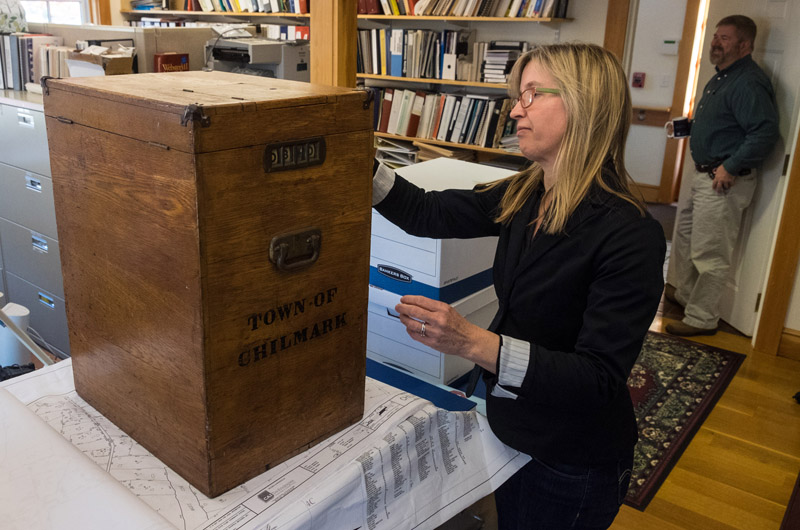
“We’ve always used it in town, and it’s one of our oldest municipal treasures,” Mrs. Manning, a longtime member of the board of registrars, said of the machine, simply labeled The Standard. “People come in and they put their ballot in, and they’re like, ‘Oh I’m number 30.’ Or ‘I’m number 20.’ Or ‘We really have 100 people who have already voted?’” Every two hours or so, a team of volunteers recounts the ballots to make sure the numbers line up.
Only Aquinnah and Chilmark still count their ballots by hand, using historic wooden boxes that have stood the test of time. But similar boxes lie hidden in clerks offices and odd corners around the Island. Edgartown was the first Island town to switch to electronic machines in the mid-1980s, followed by Oak Bluffs and Tisbury soon after, and West Tisbury around 2005. But the old oak boxes with their hand-cranks and hand-stenciled town names have been hard to give up completely.
Edgartown town clerk Wanda Williams took a break from programming the town’s electronic voting machine this week to show how voting was done in the past. She took an elevator up to the third floor, where the town’s old ballot box still stands by a window surrounded by file cabinets and other municipal debris. As with most of the ballot boxes on the Island, Edgartown’s was made by the Perfection Ballot Box Company of Worcester sometime in the early 1900s. Under the lid, the gears and wooden chute resemble a sort of mousetrap, with an ink-stained wheel in the middle (embossed with the town name) that would cancel each ballot as it passed through.
As with most of the other Perfection boxes, a metal casing around the chute dates the patents to 1901 and 1905. Each of those boxes also includes a certificate of inspection glued to the inside, with a hand-written date and the signature of the secretary of the commonwealth at the time. Edgartown’s certificate is dated March 27, 1924, and hand-signed by secretary Frederick W. Cook, who served until 1949. Other dates around the Island range from 1916 to 1936, although at least two of the boxes are much older.
Edgartown also maintains a relic that may be unique on the Island: a small hexagonal box that would greet residents before they cast their votes. The box still contains rectangular paper strips with random excerpts from the state constitution. On voting day, residents would need to prove they could read before they could vote — possibly to reduce confusion at the polls.
Marion Mudge, former longtime clerk in Tisbury, recalled using her town’s Perfection ballot box when she came onboard in the 1980s. She said the town still has it, although it may have retired to the Tisbury Senior Center. (The Gazette was unable to locate the box by press time.)
Counting the ballots by hand could take all night, Mrs. Mudge said, but the town was slow to change, since the selectmen at the time tended to pack the annual ballots with capital spending requests and the newer machines couldn’t handle that many questions. When the selectmen finally changed their approach in the late 1980s, the ballot boxes followed suit.
“And it saved people from staying awake till five in the morning,” Mrs. Mudge said.
Oak Bluffs has two Perfection boxes, both of which were back in action at the early-voting polls this week, stacked one on top of the other. Former town clerk Deborah Ratcliffe said it was only the second time she can remember seeing both boxes in use at once. (Early voting is new in the state this year, and Island towns are storing the ballots until Nov. 8.) Voters quietly filled out their ballots at a series of plastic fold-out voting booths (new last year) and deposited them directly into the upper box, which was certified in 1916.
Oak Bluffs did not switch immediately to the electronic scanning machines, Mrs. Ratcliffe said, but for a time used a different style of wooden box that was taller and painted gray.
“It had the hand-turn and it had a cancellation stamp and it counted the ballots, but it wasn’t as cute as these are,” she said.
Voters occasionally stopped to admire the old boxes, which after Nov. 4 will resume their post as end tables in the town clerk’s office.
West Tisbury town clerk Tara Whiting also shares her office with old ballot boxes — one dating to the town’s incorporation in 1892 and donated by the families of Marjorie and Harold Rogers after it was discovered at an estate sale a few years ago. About half as wide as its Perfection-brand successor, and colored a deep mahogany red, the older box resembles the one in Aquinnah, but is labeled The Ideal. It has no date or manufacturer’s label, although an accompanying memo to town clerks from 2001 suggests it may have been made by the former Cross Company.
Under the lid, the ink-splattered directions run an entire page in length, and indicate the complexity of the inner workings. The crank only worked once a ballot was inserted, for example, and turning the crank would both consume the ballot and reopen the wooden hatch for the next one.
“Use no other ink than that approved by the Secretary,” the instructions state. A chicken wire basket within the box would catch the falling ballots, which were counted at the end of the night.
A town ballot from 1946 — apparently the last year before West Tisbury switched to the Perfection box — accompanies The Ideal, and includes a number of familiar Island names. Daniel Manter, grandfather of current town selectman Jeffrey (Skipper) Manter, was running for selectman at the time. Harold Rogers was running for constable, a role that would have entailed manning the ballot box on election day. Perhaps as an indication of the town’s progressive leanings even then, the ballot splits almost evenly between genders, with five women and six men running for office.
West Tisbury resident and sign maker Thomas Hodgson recalled doing pre-election maintenance on the town’s Perfection ballot box in the 1990s and early 2000s, when his stepsister Prudence Whiting was town clerk. He still misses the old contraption, which would literally ring in the annual town elections.
“I imagine there are very, very few towns left using these old wood and metal gems,” Mr. Hodgson said in an email this week. “If you needed a part, you’d have to make it yourself.” But he added that “any competent clocksmith could do the job,” and if maintained, the boxes could last for centuries.
Chilmark town clerk Jennifer Christy bought a spare Perfection box for less than $100 on Ebay around 2014, in the event that the current box (certified in 1932) breaks down, although it never has.
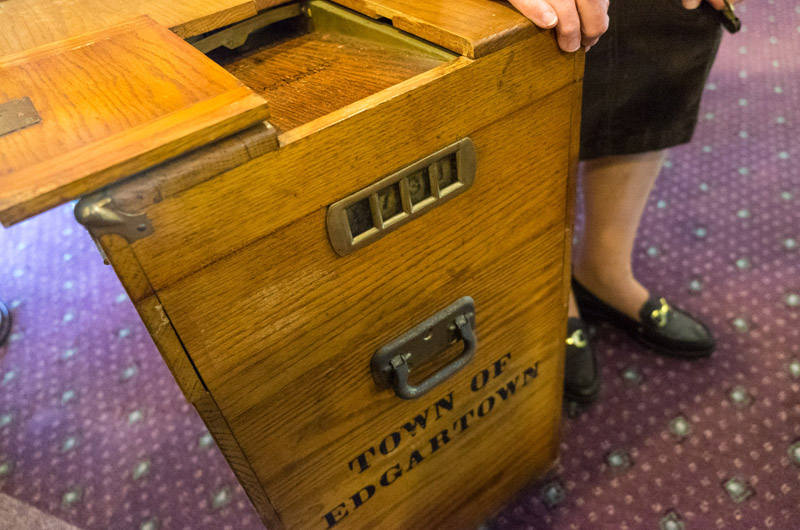
“I had some money in my budget and I was feeling like we should be prepared,” she said, noting that the Perfection models were originally approved by the state. There is no requirement to upgrade to electronic machines, she added, unless a town wants to, in which case the state lays out a specific process.
In Aquinnah, at least, Mrs. Manning said the town has never considered using anything but it’s original ballot box from 1884 (the year Massachusetts became the first state to adopt the secret ballot method used today).
“We have an electronic machine for people who are handicapped, but that’s never used,” she said, motioning to a large luggage-shaped container in another corner of the room. But she added that the state supplied the machine free of charge, so there was nothing lost.
As with the other historic ballot boxes around the Island, much of the history of The Standard has disappeared with the passage of time, and Mrs. Manning said no one knows just how the town acquired it. But after demonstrating the crank and bell one more time, she added: “If we were ever to replace it, personally, I’d like to find one just like it.”


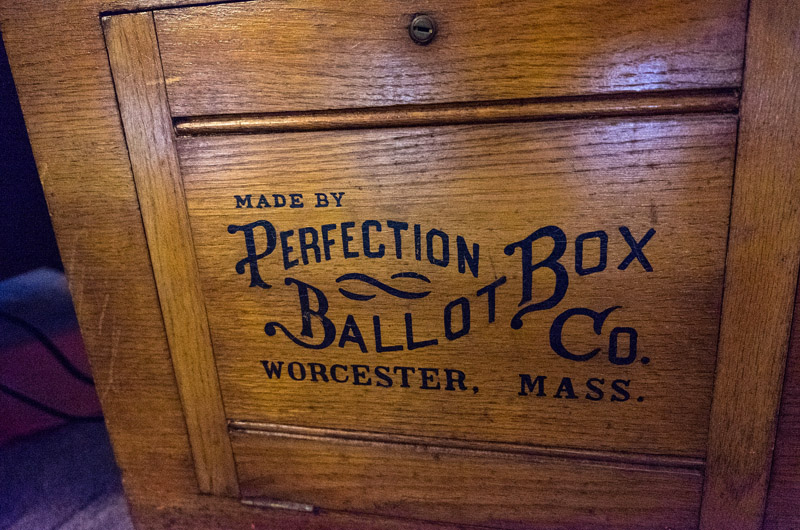
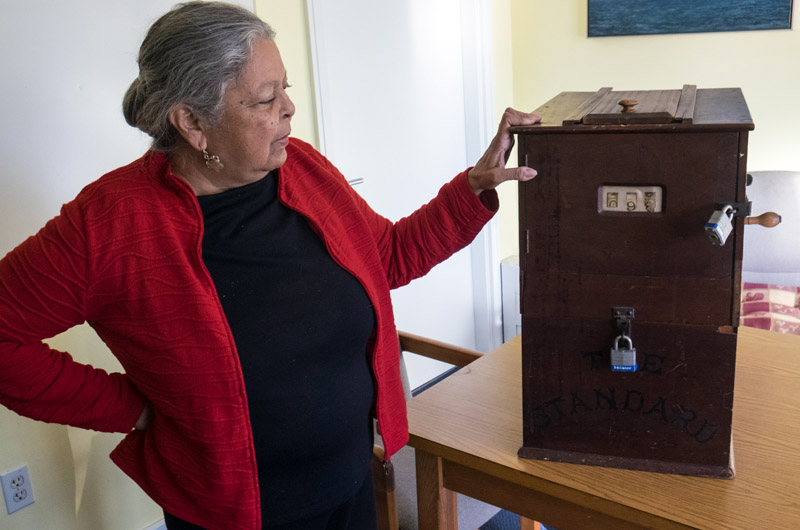
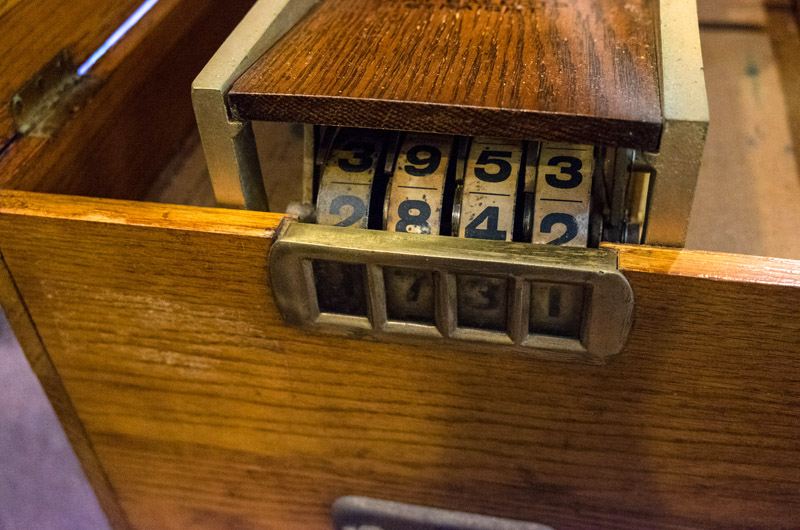





Comments (7)
Comments
Comment policy »